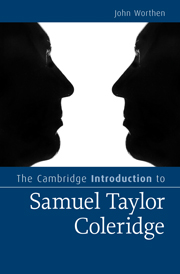Book contents
- Frontmatter
- Contents
- Illustrations
- Preface
- Acknowledgements
- Abbreviations
- Chapter 1 Early life and contexts: 1772–1802
- Chapter 2 Poetry
- Chapter 3 Notebooks
- Chapter 4 Mid-life works and contexts: 1803–1814
- Chapter 5 Language
- Chapter 6 Criticism
- Chapter 7 Later works and contexts: 1815–1834
- Afterword
- Notes
- Further reading
- Index
- Cambridge Introductions to Literature
Chapter 1 - Early life and contexts: 1772–1802
Published online by Cambridge University Press: 05 August 2012
- Frontmatter
- Contents
- Illustrations
- Preface
- Acknowledgements
- Abbreviations
- Chapter 1 Early life and contexts: 1772–1802
- Chapter 2 Poetry
- Chapter 3 Notebooks
- Chapter 4 Mid-life works and contexts: 1803–1814
- Chapter 5 Language
- Chapter 6 Criticism
- Chapter 7 Later works and contexts: 1815–1834
- Afterword
- Notes
- Further reading
- Index
- Cambridge Introductions to Literature
Summary
Samuel Taylor Coleridge was born in the small town of Ottery St Mary in Devon in 1772, the youngest son of a Church of England clergyman who was also a grammar school headmaster. His father was a scholarly man who wrote several books, including a Latin grammar; his mother was a capable organiser determined that her children should do well in the world. By the age of three, the boy was reading on his own; early and late he took every opportunity to read and to tell others about what he had read. By the age of six, he had discovered that at Ottery Fair the old books were ‘formidable Rivals to Gilt Gingerbread’ and had read among other works a volume of the Arabian Nights three times (CNv. 5829, CLi. 347, Friendi. 148). His whole future life depended upon this early initiation into the pleasures of reading; he lost himself in books, and nothing else would ever be quite so interesting. Later in life he described the technique of speed-reading he developed when young: ‘stereotype-wise by whole pages at a glance: as if my eyes & brain had been a claud Lorrain Mirror, or a Camera Obscura’ (CMiv. 336–7). He did outstandingly at school.
- Type
- Chapter
- Information
- Publisher: Cambridge University PressPrint publication year: 2010

